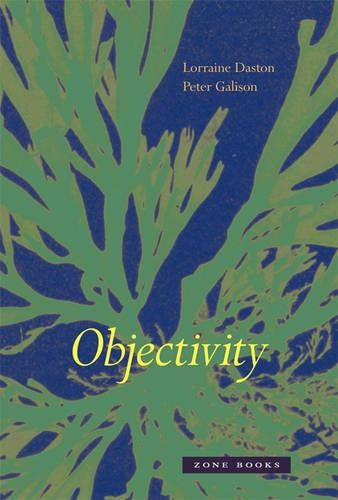Objectivity

Ratings/reviews counts are updated frequently.
Check link for latest rating. ( 381 ratings, 37 reviews)Read More
Found a better price? Request a price match

Objectivity
Book Hero Magic created this recommendation. While it's new and still learning, it may not be perfect - your feedback is welcome! IS THIS YOUR NEXT READ?
Objectivity
The emergence of objectivity in the mid-nineteenth-century sciences, as revealed through images in scientific atlases-a story of how lofty epistemic ideals fuse with workaday practices.
Historically brilliant, philosophically profound, and beautifully written, Objectivity will be the focus of discussion for decades to come. At one and the same time a history of scientific objectivity and a history of the scientific self, rarely have rigor and imagination been combined so seamlessly and to such deep effect. No one who opens this book can fail to be engaged and provoked by its energy, ideas, and arguments. One emerges from reading it as if from a series of intellectual earthquakes -- sound but no longer safe. -- Arnold Davidson, author of The Emergence of Sexuality: Historical Epistemology and the Formation of Concepts Objectivity by Lorraine Daston and Peter Galison is not just a fine book, it is that rare thing, a great book. It is almost shockingly original, genuinely profound, and amazingly learned without ever being pedantic. It should force everyone interested in science and its history or in objectivity and its history to think more deeply about what they think they already know. It gives me great satisfaction to learn that thinking and writing of this brilliance and depth are still going on, even in this age of consumerism and mass markets. -- Hilary Putnam, author of Ethics without Ontology This richly illustrated book deeply renews the meaning of accurate reproduction by showing how many ways there have been to be 'true to nature.' Art science and reproduction techniques are merged to show that 'things in themselves' can be presented with their vast and beautiful company. This splendid book will be for many years the ultimate compendium on the joint history of objectivity and visualization. -- Bruno Latour, author of Politics of Nature: How to Bring the Sciences into Democracy
The emergence of objectivity in the mid-nineteenth-century sciences is revealed through images in scientific atlases—a story of how lofty epistemic ideals fuse with workaday practices. Objectivity has a history, and it is full of surprises. In Objectivity, Lorraine Daston and Peter Galison chart the emergence of objectivity in the mid-nineteenth-century sciences and show how the concept differs from its alternatives: truth-to-nature and trained judgment. This is a story of lofty epistemic ideals fused with workaday practices in the making of scientific images.
From the eighteenth through the early twenty-first centuries, the images that reveal the deepest commitments of the empirical sciences—from anatomy to crystallography—are those featured in scientific atlases, the compendia that teach practitioners what is worth looking at and how to look at it. Galison and Daston use atlas images to uncover a hidden history of scientific objectivity and its rivals. Whether an atlas maker idealises an image to capture the essentials in the name of truth-to-nature, refuses to erase even the most incidental detail in the name of objectivity, or highlights patterns in the name of trained judgment, is a decision enforced by an ethos as well as by an epistemology.
As Daston and Galison argue, atlases shape the subjects as well as the objects of science. To pursue objectivity—or truth-to-nature or trained judgment—is simultaneously to cultivate a distinctive scientific self wherein knowing and knower converge. Moreover, the very point at which they visibly converge is in the very act of seeing not as a separate individual but as a member of a particular scientific community. Embedded in the atlas image, therefore, are the traces of consequential choices about knowledge, persona, and collective sight.
Objectivity is a book addressed to anyone interested in the elusive and crucial notion of objectivity—and in what it means to peer into the world scientifically.
Series: Zone Books
View allBook Hero Magic summarised reviews for this book. While it's new and still learning, it may not be perfect - your feedback is welcome! HOW HAS THIS BEEN REVIEWED?
Objectivity by Lorraine Daston and Peter Galison receives high praise for its in-depth research and thought-provoking content, offering a significant contribution to the history of scientific knowledge. It is described as beautifully crafted and intellectually stimulating, highlighting the evolution of the concept of scientific objectivity from the 17th century to modern times. Reviewers commend the book for its fascinating narrative that addresses both epistemic and ethical dimensions, whilst making complex arguments accessible through its stunning visual presentation.

Book Details
INFORMATION
ISBN: 9781890951795
Publisher: Zone Books
Format: Paperback / softback
Date Published: 12 July 2010
Country: United States
Imprint: Zone Books
Illustration: 32 color illus., 108 b&w illus.; 140 Illustrations, unspecified
Audience: Professional and scholarly
DIMENSIONS
Spine width: 39.0mm
Width: 152.0mm
Height: 229.0mm
Weight: 980g
Pages: 504
About the Author
Lorraine Daston is Director at the Max Planck Institute for the History of Science in Berlin and Visiting Professor in the Committee on Social Thought at the University of Chicago. She is the coauthor (with Katharine Park) of Wonders and the Order of Nature, 1150–1750 and (with Peter Galison) Objectivity and the editor of Things that Talk: Object Lessons from Art and Science, all three published by Zone Books. Peter Galison is Pellegrino University Professor of the History of Science and of Physics at Harvard University. He is the author of Einstein's Clocks, Poincaré's Maps: Empires of Time, How Experiments End, and Image and Logic: A Material Culture of Microphysics, among other books, and coeditor (with Emily Thompson) of The Architecture of Science (MIT Press, 1999).
More from Philosophy & Psychology
View allWhy buy from us?
Book Hero is not a chain store or big box retailer. We're an independent specialist on a mission to help more Kiwis rediscover a love of books and reading!

Service & Delivery
Our cozy 200m2 warehouse in Auckland holds over 10,000 books in-stock so you're not waiting for books to arrive from overseas.

Auckland Pick Ups
We're an online-only store but for your convenience you can pick up your order for free from our warehouse in Hobsonville.

Our Gifting Service
Books make wonderful thoughtful gifts and we're here to help with gift-wrapping and cards. We can even send your gift directly to your loved one.



























